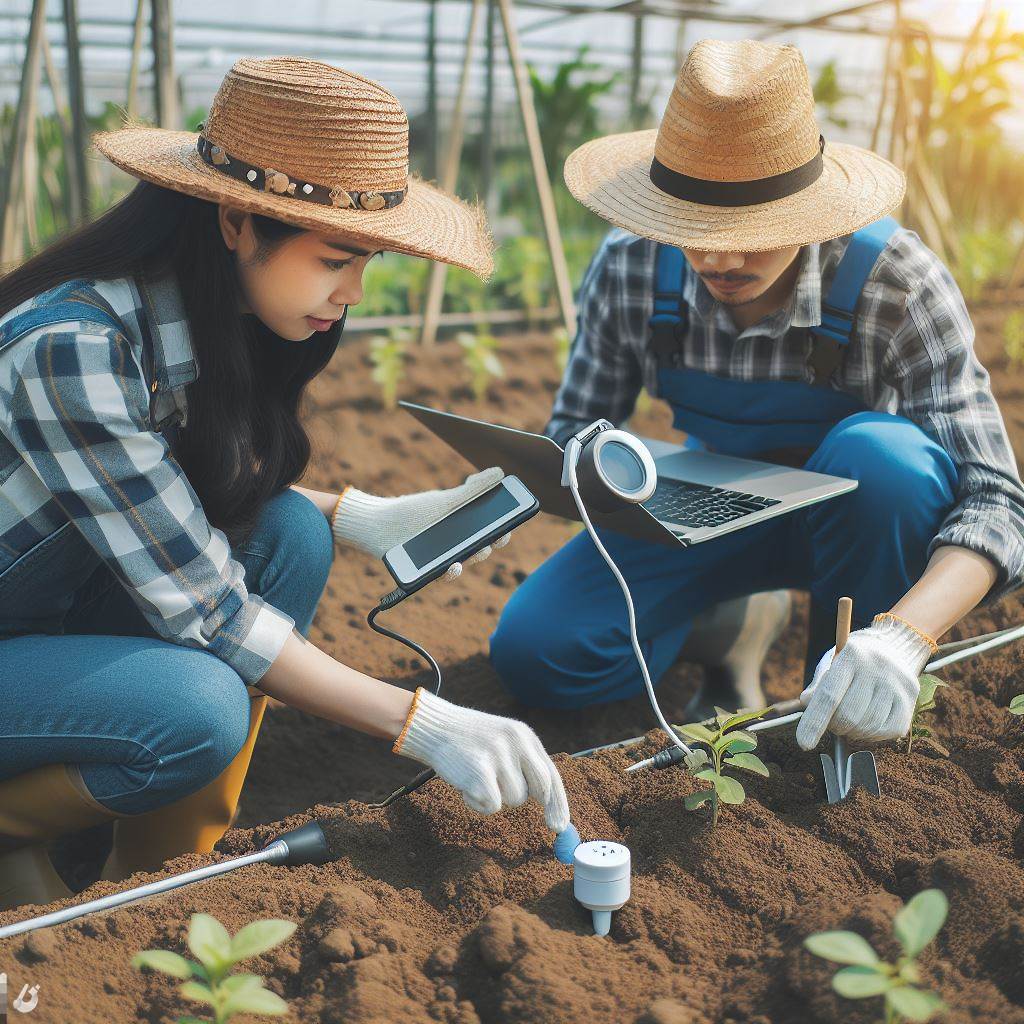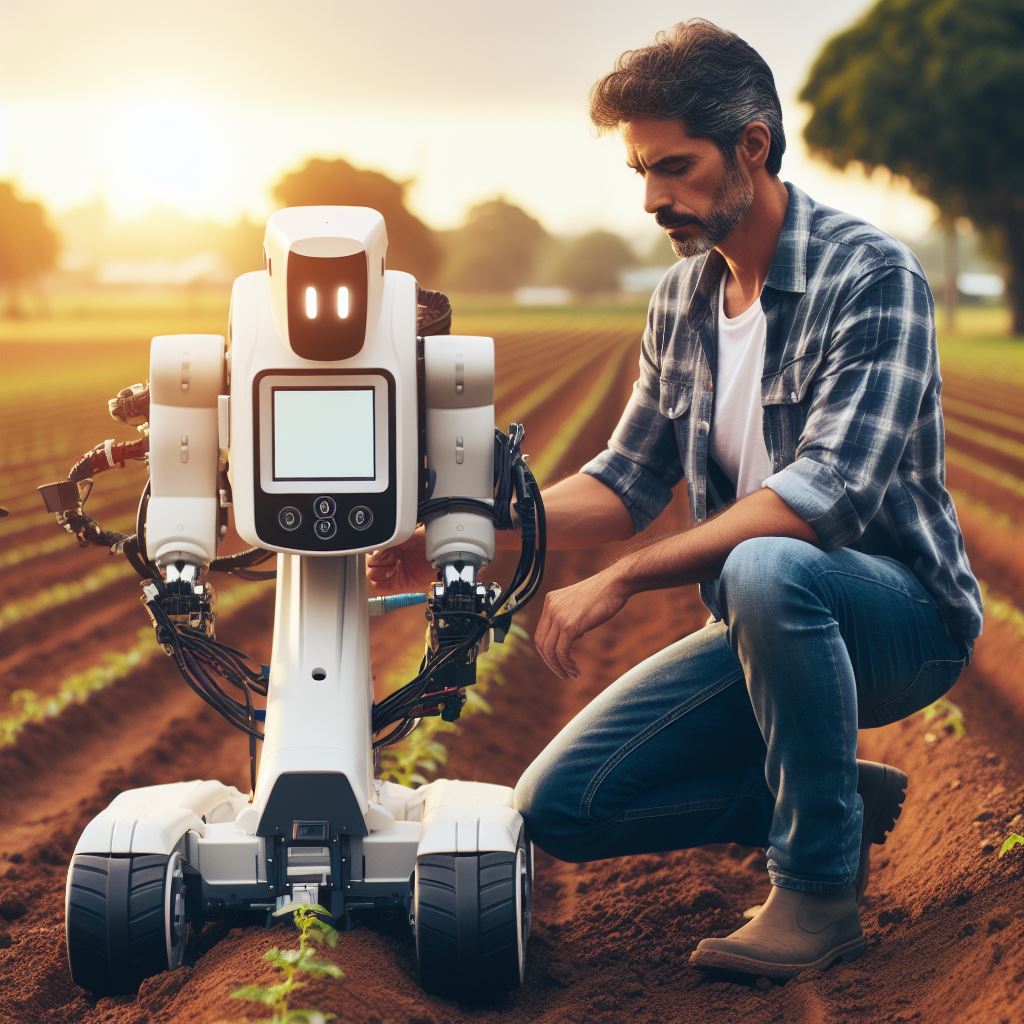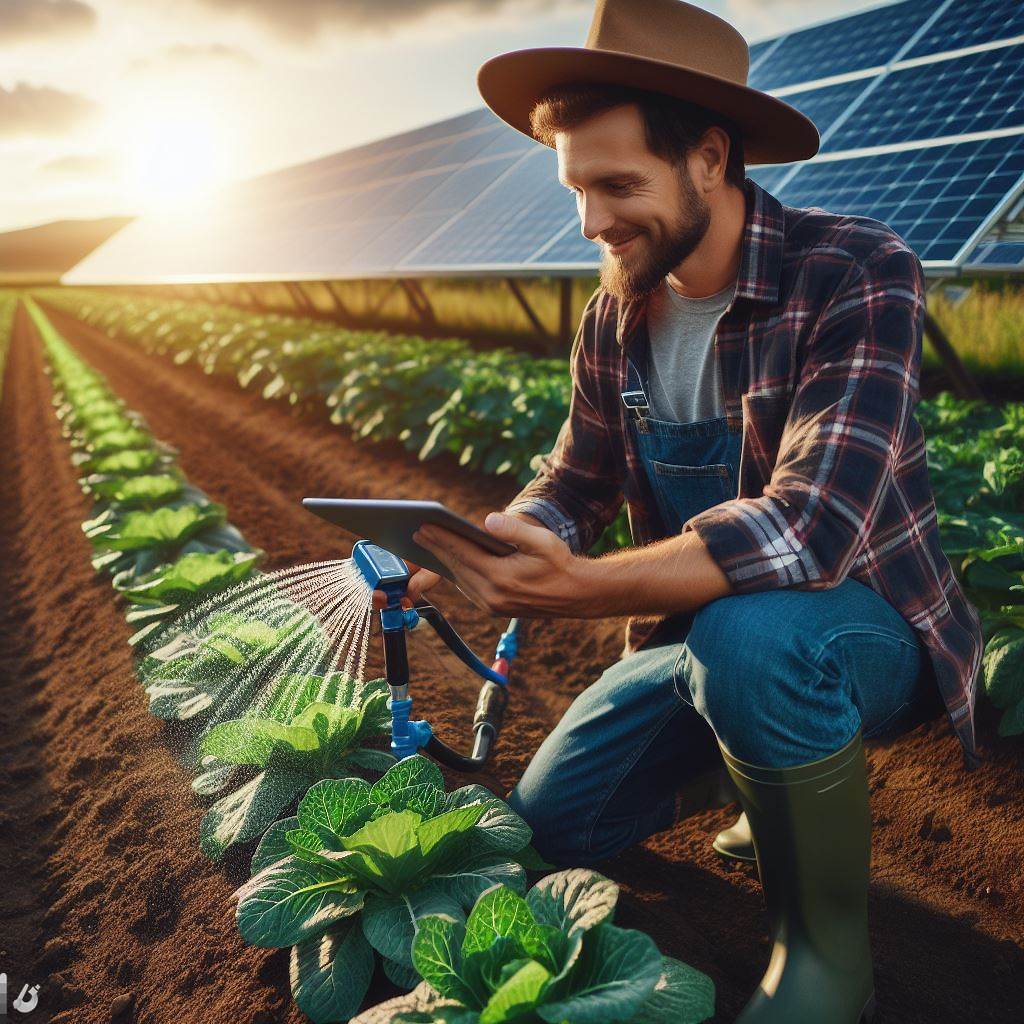Introduction
AI in farming, also known as precision agriculture, is revolutionizing the way farming is done.
Definition of AI
Artificial Intelligence refers to computer systems that can perform tasks without human intervention.
The growing importance of AI is evident in various industries, from healthcare to transportation.
In agriculture, AI is applied to optimize crop yields, minimize resource waste, and improve decision making.
Applications of AI in Farming
- Crop management: AI helps monitor crop health, detect diseases, and optimize irrigation and fertilization.
- Precision planting: AI technologies assist in analyzing soil conditions and determining the best planting locations.
- Smart harvesting: AI algorithms enable autonomous machines to efficiently and accurately harvest crops.
- Pest control: AI allows for real-time monitoring and early detection of pests, minimizing the need for chemical pesticides.
- Data analysis: AI processes vast amounts of data to provide insights and predictions for better crop management.
Benefits of AI in Farming
- Increased efficiency: AI-powered systems automate tasks, reducing labor and time requirements.
- Resource optimization: AI helps farmers make informed decisions on water, fertilizer, and pesticide usage.
- Higher crop yields: AI enables optimal crop management, leading to increased productivity and profitability.
- Environmental sustainability: AI assists in reducing waste, conserving resources, and implementing eco-friendly practices.
Basically, AI in farming offers immense potential to revolutionize agriculture by improving efficiency, sustainability, and productivity.
Importance of Precision Agriculture
Definition and goals of precision agriculture
Precision agriculture, also known as precision farming, is a modern approach to farming that utilizes technology and data analysis to optimize crop production.
Its goals include increasing yield, improving efficiency, and minimizing environmental impact.
- Increased yield: Precision agriculture enables farmers to identify and address issues in real-time, leading to higher crop yields.
- Improved efficiency: Through the use of AI and data-driven insights, precision agriculture helps farmers optimize resource allocation, such as water, fertilizers, and pesticides.
- Minimized environmental impact: By precisely applying inputs only where and when needed, precision agriculture reduces chemical use and prevents unnecessary environmental damage.
Benefits and advantages of precision agriculture
- Enhanced crop management: Precision agriculture provides farmers with accurate and timely information about plant health, soil conditions, and weather patterns, allowing for timely interventions.
- Cost savings: By utilizing AI technology, farmers can reduce wastage of resources, maximize efficiency, and save on labor costs.
- Increased sustainability: Precision agriculture practices promote sustainable farming by reducing water and chemical runoff and minimizing greenhouse gas emissions.
- Data-driven decision making: AI-powered precision agriculture collects and analyzes vast amounts of data, empowering farmers to make informed decisions based on accurate insights.
Role of AI in enabling precision agriculture
- Data collection and analysis: AI technology, such as drones and sensors, collect data on crop health, soil conditions, and weather patterns, which is then analyzed to provide actionable insights.
- Predictive analytics: AI algorithms can process historical data to predict future trends, allowing farmers to plan and optimize their crop production strategies.
- Automated systems: AI-powered automation systems can control irrigation, fertilization, and pesticide application, ensuring precise and timely distribution.
- Disease and pest detection: AI systems can assess images of crops to identify diseases and pests early, enabling quick interventions and minimizing crop loss.
- Crop monitoring and growth analysis: AI technology can continuously monitor crops, tracking their growth progress and identifying factors that may impact yield.
Generally, precision agriculture, enabled by AI technologies, plays a crucial role in modern farming practices.
By employing data-driven decision making, advanced analytics, and automation, precision agriculture maximizes crop productivity while minimizing environmental impact.
The benefits of precision agriculture extend beyond increased yield and cost savings to include improved sustainability and more informed farming practices.
As technology continues to advance, the potential for AI in transforming the agricultural industry only grows stronger.
Read: Precision Agri: GPS Guided Farming Explained
AI Technologies in Farming
The application of AI technologies in farming has revolutionized the agricultural industry by enhancing productivity, minimizing resource wastage, and reducing negative environmental impacts.
In this section, we will explore two key aspects of AI in farming: remote sensing and data collection, as well as data analysis and prediction.
Remote Sensing and Data Collection
Remote sensing technologies, such as satellite imagery and drones, have become invaluable tools for farmers.
Transform Your Agribusiness
Unlock your farm's potential with expert advice tailored to your needs. Get actionable steps that drive real results.
Get StartedThese technologies allow farmers to obtain accurate and timely data about their fields, which is essential for making informed decisions about irrigation, fertilization, pest control, and harvesting.
Satellite imagery and drones
Satellite imagery provides detailed information about crop health, vegetation indices, and soil moisture levels.
By capturing images from space, farmers can easily identify areas of their fields that require attention and take appropriate action.
Drones, on the other hand, offer a more precise and localized view of the fields.
They can capture high-resolution images, collect data on crop health, monitor plant growth, and detect pests and diseases.
Soil sensors and weather monitoring
In addition to remote sensing technologies, data collection through soil sensors and weather monitoring systems is crucial for effective farm management.
Soil sensors measure various soil parameters such as moisture, temperature, and pH levels.
These sensors provide real-time data that helps farmers optimize irrigation schedules, prevent overwatering, and identify areas with poor soil conditions.
Weather monitoring systems collect data on climatic conditions such as temperature, humidity, wind speed, and rainfall.
This information allows farmers to anticipate extreme weather events, plan accordingly, and adjust their farming practices to minimize crop losses.
Data Analysis and Prediction
Machine learning algorithms
Once data is collected, AI technologies play a vital role in analyzing and predicting outcomes to optimize farming processes.
Machine learning algorithms, a subset of AI, enable farmers to process large datasets and gain insights that would be impossible to obtain manually.
By training machine learning models with historical and real-time data, farmers can predict crop diseases, nutrient deficiencies, and pest infestations.
These predictions help farmers take preventive measures and apply targeted interventions, reducing the need for excessive pesticide or fertilizer use.
Predictive modeling and crop yield estimation
Predictive modeling techniques further enhance decision-making in farming.
These models integrate multiple variables such as weather data, soil conditions, and crop characteristics to estimate crop yields.
By accurately estimating crop yields, farmers can optimize their resource allocation, negotiate contracts, and plan for efficient harvesting and transportation.
Essentially, AI technologies have revolutionized precision agriculture by enabling remote sensing and data collection, as well as data analysis and prediction.
These technologies empower farmers to make data-driven decisions, enhance productivity, and promote sustainable farming practices.
By harnessing the power of AI, farming can become more efficient, economically viable, and environmentally friendly.
Read: Robotic Hands in Fields: Future of Harvesting
AI Solutions for Crop Management
Weed and pest control
AI is revolutionizing crop management by offering innovative solutions for weed and pest control.
These advancements not only streamline the process, but also significantly reduce the use of harmful chemicals.
Automated identification and targeted spraying
Traditional methods of weed and pest control involve indiscriminate spraying of chemicals over entire fields, leading to wastage and potential harm to beneficial organisms.
Showcase Your Farming Business
Publish your professional farming services profile on our blog for a one-time fee of $200 and reach a dedicated audience of farmers and agribusiness owners.
Publish Your ProfileHowever, AI-powered systems can precisely identify weeds and pests, allowing targeted spraying only where necessary.
This not only reduces chemical usage but also minimizes environmental impact.
Integrated pest management systems
AI offers advanced tools for integrated pest management (IPM), which focuses on sustainable and eco-friendly pest control practices.
By combining data from various sources such as weather conditions, crop health, and pest population dynamics, AI algorithms can predict pest outbreaks and help farmers take proactive measures to manage them.
Irrigation optimization
Efficient irrigation is crucial for crop health and maximizing yield.
AI-based solutions provide farmers with real-time data and analysis to optimize irrigation practices, resulting in significant water savings.
Soil moisture sensors and precision irrigation
AI-powered soil moisture sensors can accurately measure the water content in the soil, enabling farmers to determine the precise irrigation requirements of their crops.
By automatically adjusting irrigation schedules based on real-time data, farmers can ensure that crops receive adequate water without wastage.
AI-driven irrigation schedules and water conservation
AI algorithms analyze a multitude of factors such as weather conditions, evapotranspiration rates, and crop growth stage to formulate optimized irrigation schedules.
By considering these variables, AI systems minimize water usage while maximizing crop productivity.
This not only helps conserve water resources but also reduces the energy and costs associated with irrigation systems.
In general, AI solutions have immense potential in revolutionizing crop management, particularly in weed and pest control as well as irrigation optimization.
By adopting these advanced technologies, farmers can enhance their farming practices, improve sustainability, and maximize yields.
Read: Smart Farming: IoT’s Role in Agriculture Today

AI Applications in Livestock Management
Livestock management plays a crucial role in ensuring the health and productivity of farm animals.
Artificial Intelligence (AI) is revolutionizing this aspect of farming by introducing advanced technologies that enhance disease detection, improve nutrition optimization, and monitor animal behavior in real-time.
Disease detection and monitoring
Automated surveillance and health monitoring ensure early detection of diseases in livestock
AI has proven to be a game-changer in disease detection and monitoring.
Through automated surveillance and health monitoring systems, farm animals can be constantly monitored for any signs of diseases.
This proactive approach enables early detection, allowing veterinarians and farmers to take immediate action to prevent the spread of infections and reduce the impact on animal health and productivity.
Early warning systems powered by AI help in predicting disease outbreaks and taking preventive measures
The early warning systems powered by AI provide farmers with valuable insights into disease outbreaks.
By analyzing various factors such as weather patterns, animal behavior data, and historical disease records, AI algorithms can predict the likelihood of disease outbreaks.
This information helps farmers to implement preventive measures and minimize the risks associated with disease transmission, ultimately safeguarding the overall health of their livestock.
Feed optimization and nutrition
AI-driven feed formulation and rationing improve the nutritional balance and efficiency of livestock diets
AI also contributes to the optimization of feeds and nutrition in livestock management.
Traditional methods of feed formulation and rationing often lack precision, resulting in inefficient diets that may lead to health issues and reduced productivity.
Thanks to AI, farmers can now use advanced algorithms to analyze the nutritional needs of animals, taking into account various factors such as breed, age, weight, and production goals.
This AI-driven feed formulation ensures balanced and optimized diets, enhancing the overall health and performance of the livestock.
Real-time monitoring of animal feeding behavior allows for timely adjustments in feeding practices
Real-time monitoring of animal feeding behavior is another significant application of AI in livestock management.
By utilizing sensors and IoT devices, AI technology can collect data on how animals consume feed in real-time.
This data can then be analyzed to identify any deviations from normal feeding behavior, such as reduced appetite or unusual patterns.
Timely detection of such changes allows farmers to respond promptly and adjust feeding practices accordingly, ensuring optimal nutrition and well-being of the animals.
In essence, AI applications in livestock management offer immense benefits to farmers by revolutionizing disease detection and monitoring as well as feed optimization and nutrition.
By leveraging automated surveillance, early warning systems, AI-driven feed formulation, and real-time monitoring of feeding behavior, farmers can enhance the health, productivity, and overall well-being of their livestock.
The precision and efficiency provided by AI technologies have the potential to significantly improve the farming industry, paving the way for a more sustainable and profitable future.
Read: Drone Tech in Agriculture: A Sky-High View
See Related Content: Vertical Farming: Agri-Tech’s Rising Star
Explore Further: Soil Health Tech: Key to Sustainable Farms
Challenges and Future Perspectives
Data privacy and security concerns
- Farmers may have concerns about the security and privacy of their data collected by AI systems.
- Confidential information such as yield data, financial records, and farm management practices need protection.
- Stricter regulations and advanced encryption techniques can address these concerns and build trust in AI technologies.
- Collaboration with cybersecurity experts and the development of secure data platforms can mitigate potential risks.
Adoption and integration challenges for small-scale farmers
- Small-scale farmers may face barriers in adopting AI technologies due to limited resources and technical expertise.
- Affordability and accessibility of AI tools, such as sensors and drones, need to be addressed.
- Training programs and support networks can facilitate the integration of AI solutions into small-scale farming operations.
- Government initiatives and funding opportunities can assist small-scale farmers in embracing AI and increasing productivity.
Potential future developments and innovations in AI farming
- AI advancements in crop monitoring, disease detection, and yield prediction can optimize resource allocation and minimize crop loss.
- Machine learning algorithms can enhance personalized crop management recommendations based on specific farm conditions.
- Robotics and automation can revolutionize labor-intensive tasks, reducing manual labor and improving efficiency.
- Integration of AI with other emerging technologies like blockchain and Internet of Things can create an interconnected farming ecosystem.
- Remote sensing technologies and satellite imagery can enable precision farming at a larger scale, contributing to sustainable agriculture.
- Collaborative efforts between researchers, farmers, and technology companies can lead to continuous innovation in AI farming.
- Adoption of AI in animal farming can improve livestock monitoring, breeding programs, and overall welfare.
- AI-driven weather forecasting and predictive models can assist farmers in making informed decisions regarding planting and harvesting.
In a nutshell, AI in farming presents immense opportunities for increasing productivity, sustainability, and efficiency in agricultural practices.
However, certain challenges must be addressed.
Data privacy and security concerns need to be mitigated by implementing robust regulations and secure data platforms.
Adoption and integration challenges for small-scale farmers can be overcome through training programs and government support.
Showcase Your Farming Business
Publish your professional farming services profile on our blog for a one-time fee of $200 and reach a dedicated audience of farmers and agribusiness owners.
Publish Your ProfileThe future of AI farming holds promising developments, including advanced crop monitoring, robotics, and integration with other emerging technologies.
With proper implementation and collaboration, AI can revolutionize the agricultural industry, benefiting farmers and ensuring global food security.
Conclusion
Recap of the importance and benefits of AI in farming
AI technology has shown immense potential in revolutionizing farming practices.
By utilizing AI, farmers can enhance their productivity and efficiency, leading to higher crop yields and reduced environmental impacts.
AI-enabled precision agriculture allows for accurate monitoring and analysis of various factors like soil conditions, weather patterns, and crop health, enabling farmers to make data-driven decisions and take timely actions.
This not only saves valuable resources but also enables sustainable farming practices. AI also paves the way for automation, reducing manual labor and improving overall efficiency.
Encouragement for farmers to embrace precision agriculture and AI technologies
It is crucial for farmers to embrace precision agriculture and AI technologies to stay competitive in the rapidly evolving agricultural landscape.
By adopting AI, farmers can unlock the full potential of their land, maximize crop production, and optimize resource allocation.
Investing in AI-based farm management systems and smart devices can provide valuable insights and recommendations, enabling farmers to make informed decisions and mitigate risks.
Furthermore, by utilizing AI, farmers can contribute to global food security by efficiently producing more food with limited resources.
Final thoughts on the potential of AI in revolutionizing farming practices
As AI technology continues to advance, the potential for its application in farming is vast.
From automated machinery to predictive analytics, AI has the ability to transform the way farming is conducted.
By harnessing AI, farmers can tackle challenges like climate change, population growth, and limited resources effectively.
The integration of AI and precision agriculture will lead to sustainable farming practices, improved food production, and increased profitability.
It is crucial for farmers to embrace AI and collaborate with technology innovators to shape the future of farming for the better.
Together, AI and agriculture can pave the way for a more efficient, sustainable, and resilient farming sector.




